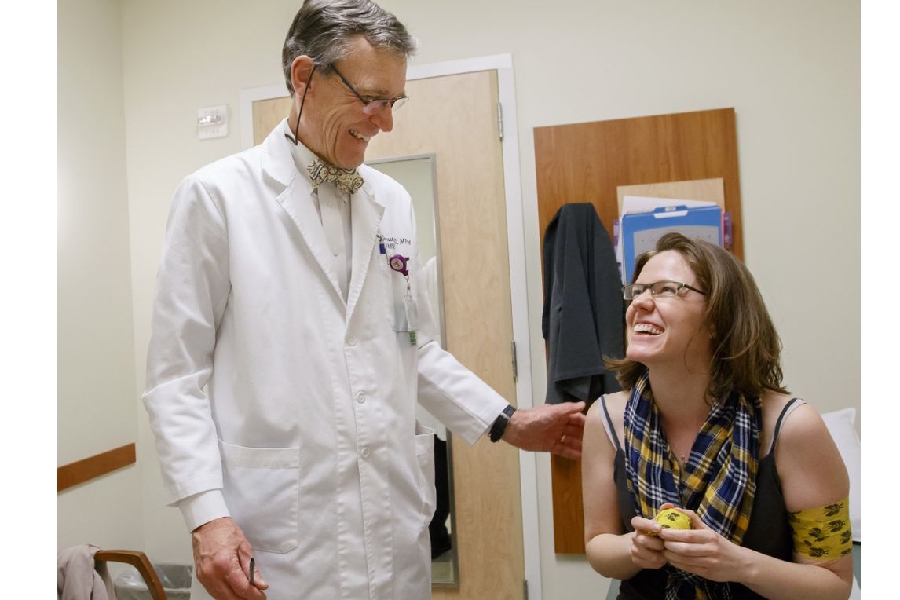A conversation with Jeff Jensen, head of OHSU’s women’s health research unit.
Jeff Jensen is vice chair for research for OHSU’s ob/gyn department and director of the university’s women’s health research unit. He is also an outspoken critic of federal family planning policy, or lack thereof — and a self-described cynic.
“Progressive, liberals — they are all going to hate me because I do animal research,” he said in a recent interview, conducted in his office at the OHSU Physician’s Pavilion. (Jensen is a senior scientist at the Oregon National Primate Research Center.) “And conservatives hate me because I do abortions, and I care for women and do family planning. It’s a thorny area. I don’t have friends.”
Jensen’s latest work targets nonsurgical permanent contraception for women around the world. His method uses polidocanol foam, an FDA-approved treatment for varicose veins.
In these edited interview excerpts, he talks about the politicization of contraception, the changing research landscape and why family planning apps aren’t the solution. (Excerpts have been edited for length and clarity.)
On permanent contraception
“The Gates Foundation has identified that family planning is an important key to world development, that allowing women to voluntarily choose to limit families is a good thing. One of the priority areas they have identified is unmet needs among women who are family completers, whose desired number of future pregnancies is zero. So that’s where permanent contraception comes in.”
The World Health Organization estimates that about 225 million women in developing countries would like to delay or stop childbearing but are not using any method of contraception.

On contraception solutions for developing countries
“In many countries, India for example, many women lack power in their relationships. They tend to be in earlier and arranged marriages, so you can complete replacement fertility by your early twenties, and then be looking at 30 years of undesired fertility. There is a very high rate of tubal sterilization in India, but in many areas it’s not easily accessible, and it involves risk.”
Related story: Digital health, new business models upend politics of abortion and contraception
His research
Many women don’t want to have hormones; they don’t want to have devices. They want to simply not have the risk of pregnancy. I think that’s fair. We are using a surfactant polidoconal that was developed originally as a local anasethetic. But it’s FDA-approved for a treatment of varicose veins. We have polidoconol in conjunction with another agent that I won’t disclose right now.”
“You deliver it as a foam. We push the agent into the uterine cavity and it moves through the Fallopian tube. It triggers a response that leads to collagen scar. That is very very hard to do. Evolution has worked extremely hard hundreds of millions of years to keep that area open. It’s very tricky to come up with a combination of agents that will cause scarring.”
On financing
“We are currently in negotiation with the Gates Foundation for continued funding to try and bring this into a phase one clinical trial. So for business people — we would love to get investors, for people who see the social value.”

On the politics of family planning
“We often in this debate fail to mention that we have over 7.5 billion people on planet Earth. We’ve decided to have all the wealth here, put a big fence around it and make everything on the outside poorer. Then we prevent anyone from coming in; if they come here, we’ll shoot them. That’s our general foreign policy approach. We underfund family planning assistance, the global gag rule and those kinds of things. So it’s atrocious policy, but we have an unmet need for family planning.”
More on the politics of family planning
“While contraception is universally used in women, and women benefit greatly from being able to voluntarily control their fertility, we see this tremendous social anxiety about it that’s driven in large part and merged with the Republican party as a theme — that contraception services shouldn’t be publicly funded and that abortion is universally bad and should be eliminated. So we have this alignment with a whole political party that is anti-contraception, anti-family planning and anti-women. “
On progressive opposition
“Then you have well-meaning progressives on the other side who think about the individual, who say: ‘Somebody may have been harmed, and this big bad company is making money off of this product, because what’s a million dollars to Bayer health care compared to this poor lady and her suffering?’ So the trial attorney pockets half a million along the way.”
Earlier this summer the pharmaceutical giant Bayer announced it will halt sales of its controversial Essure birth-control device in the United States at the end of the year, following reports the product had created scores of health problems.
The financial impacts
“This leaves a hole. There has been a tremendous divestment by big pharma in the whole contraception research arena. At the same time you have a decrease at the National Institutes for Health because you have a large group of people who want to get funding. Companies are investing in safe bet technologies, such as: ‘Oh, let’s have French vanilla cherry.’ These are premarketing things. The industry is changing; you have smaller companies that are trying to operate in niche areas.”
On fertility tracking apps
“People who rely on natural family planning have naturally large families.
I see apps as one new way of not solving age-old problems. I have an app for scheduling. I still miss stuff all the time. Why? Because that’s who I am.
People act stupid around sex. And that’s OK. Women should be able to access the same space that men can access without having to think about it or worry about it for pregnancy risk. You shoud be able to share intimacy as makes sense within context of your life, as much or as little as you’re comfortable with.”
To subscribe to Oregon Business, click here.




